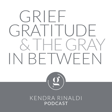
Affirmations, Meditation and Mindfulness in Grief with Ashmeeta Rama Madhav
Ashmeeta Rama Madhav is an educator, grief support advocate/expert, entrepreneur, author, and lifelong learner. She has been intimately acquainted with grief since her early twenties, having experienced miscarriage, rejection, and the loss of her parents and husband, which exposed her to a range of profound emotions. Her story is one of love, acceptance, forgiveness, gratitude, growth, and self-discovery, a narrative that resonates with those who have faced loss or are on a path of self-discovery following loss.
Through her personal experiences, Ashmeeta has developed a deep appreciation for the significance of personal growth within the journey of the soul. Her mission is to share the knowledge she's gained with others. At the heart of her book, "What’s Your Story?" is her passion for helping others and sharing her experiences. Through this book, she shares her personal journey through grief and self-discovery with the intention of providing and inspiration to those confronting similar experiences.
Ashmeeta's desire is for others to recognize that profound loss need not signify the end of one's story; rather, it can mark the commencement of a new and meaningful chapter. Her message is one of hope and healing, and she is here to help guide the grieving to feel alive again.
https://storyoutellyourself.com/
Contact Kendra Rinaldi to schedule a free discovery coaching call or to be a guest on the podcast


